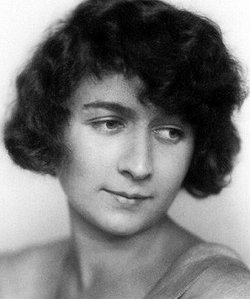Ilse Weber facts for kids
Quick facts for kids
Ilse Weber
|
|
|---|---|
 |
|
| Born |
Ilse Herlinger
11 January 1903 Witkowitz, Margraviate of Moravia, Austria-Hungary
|
| Died | 6 October 1944 (aged 41) Auschwitz-Birkenau, German-occupied Poland
|
| Nationality | Czech |
| Occupation | Poet and writer |
| Known for | German-language songs for Jewish children |
Ilse Weber (born January 11, 1903 – died October 6, 1944) was a talented Jewish poet and writer. She was born in a town called Witkowitz, near Ostrava. Ilse was best known for writing songs and plays for Jewish children in German. She married Willi Weber in 1930. Sadly, during World War II, she chose to go to Auschwitz with the children from Theresienstadt and was killed there, along with her son, Tommy. Her most famous book was "Mendel Rosenbusch: Tales for Jewish Children" (1929).
Ilse Weber's Life Story
As a child, Ilse loved music. She learned to sing and play many instruments, including the guitar, lute, mandolin, and balalaika. Even though she was very musical, she never planned to become a professional musician.
In 1930, she married Willi Weber and they moved to Prague. There, she wrote for children's magazines and also worked as a producer for Czech Radio. When the Nazis took over Czechoslovakia in 1939, the Webers managed to send their oldest son, Hanuš, to safety in Sweden. He traveled on a special journey called a "Kindertransport" (Children's Transport). Hanuš survived the war and now lives in Stockholm. His son, born in 1977, is named Tommy, in memory of Ilse's younger son who died with her.
In February 1942, Ilse and Willi were sent to the Theresienstadt concentration camp. Ilse worked as a night nurse in the camp's children's hospital. She did everything she could to help the sick children, even though Jewish prisoners were not allowed to have medicine. During her time there, she wrote about 60 poems. She also set many of these poems to music. Her songs used simple tunes and words to describe the terrible things happening around her. She would play her guitar while singing. Some of her well-known songs include "Lullaby," "I Wandered Through Theresienstadt," and "Wiegala."
In October 1944, Ilse's husband, Willi, was sent to Auschwitz. Ilse decided to go with him, taking their son Tommy, because she wanted to keep her family together. Sadly, she and Tommy were killed shortly after they arrived. Willi Weber survived the war and lived for another 30 years.
Many years later, in 2018, one of Ilse's former patients from Theresienstadt, Aviva Bar-On, sang one of Ilse's songs from memory during a concert in Jerusalem. This concert honored the musicians and composers who suffered in Nazi concentration camps.
Ilse Weber's Writings
Ilse Weber's most popular book was "Mendel Rosenbusch: Tales for Jewish Children," published in 1929. The main character, Mendel Rosenbusch, is a kind old man. He gets a magic coin that lets him become invisible. He uses this power to secretly do good deeds for his neighbors. Ilse's stories are full of clever observations and gentle humor, making them enjoyable for people of all ages.
Her first stories, written in 1925, were put together in a book called "The Scooter Race and Other Stories" (1930).
Ilse's poems from Theresienstadt were collected in a book titled "Inside These Walls, Sorrow Lives" (1991). Her songs have been recorded many times, especially "Lullaby." Famous singers like Anne Sofie von Otter have performed them. In 2008, a German publisher released a collection of her letters and poems called Wann wohl das Leid ein Ende hat (When will the suffering come to an end). Ilse's surviving son, Hanuš, took part in an event in Berlin to remember his mother's work. He also wrote a book about her life called Ilse: A Love Story Without a Happy Ending.
Her song "Wiegala" is also used in a play called Indecent by Paula Vogel.
Works
Writing
- Märchen (Fairy Tales), 1928
- Die Geschichten um Mendel Rosenbusch: Erzählungen für jüdische Kinder (Mendel Rosenbusch: Tales for Jewish Children), 1929
- Das Trittrollerwettrennen (The Scooter Race), 1936
- In deinen Mauern wohnt das Leid: Gedichte aus dem KZ Theresienstadt (Inside These Walls, Sorrow Lives: Poems from Theresienstadt Concentration Camp), 1991
- Wann wohl das Leid ein Ende hat (When Will Suffering End), 2008; edited by Ulrike Migdal
- "Dancing on a Powder Keg": Ilse Weber's Letters and Poems; Translated from the German, and Foreword by Michal Schwartz, Ruth Bondy on Theresienstadt, Afterword by Ulrike Migdal; Bunim & Bannigan, Ltd, in association with Yad Vashem, 2017
See also
 In Spanish: Ilse Weber para niños
In Spanish: Ilse Weber para niños

